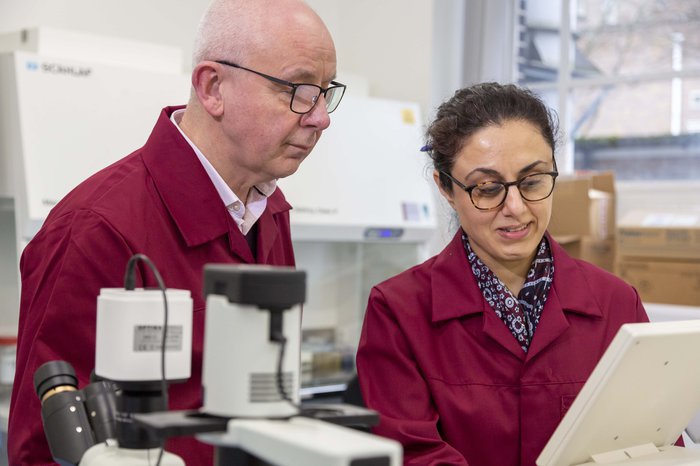Strategy update: How we'll set the agenda on blood cancer research

We've been developing our new strategy and you might have read about our progress in blogs on the mission to reaching our vision .
Since our charity was formed in 1960, we have invested over £500m in lifesaving blood cancer research. Research remains at the core of what we do as a charity, and we are clear that this will not change as we start this new chapter in the story of Blood Cancer UK. Only research will save lives and bring forward that day when no-one dies of blood cancer, or their blood cancer treatment.
This article sets out how we’ll deliver research in this new strategy period. We’ll be focusing on:
- Delivering high-quality research that saves lives
- Setting the agenda for blood cancer research in the UK
- Moving away from purely funding to respond to research applications
- Positioning ourselves as the blood cancer research experts in the UK.
Our commitment to high-quality research
We recently launched our new Research Strategy which set out the principles of how we want to fund research over the next five years. This had lots of data and evidence to draw on, so we set out not to repeat this work, but to ensure that our research programme linked back to both our mission and vision.
It is essential that we retain our commitment to only funding high-quality, world-class research, this means our research is always reviewed by experts to ensure it is groundbreaking, but can also be delivered.
With this robust framework for quality research at the forefront of our minds, we set about answering a key question: how could our research best achieve our vision and mission and accelerate the day when no-one dies of their blood cancer or blood cancer treatment?
Investing in research that saves lives.
We think these are the research areas that will mean the biggest shift in terms of lives saved: treatment, prevention, improving diagnosis, COVID-19 and other infections.
We won’t just focus on individual blood cancers, as these topics will sit across all types of blood cancer. Moreover, we’ve repeatedly seen research results from one cancer or disease type be applied to others.
Setting the blood cancer research agenda
To date, our research programme has awarded funding in response mode. This means researchers apply with questions and projects they have written. We think it’s important to move to a mixed funding model where we will ask for applications on a set topic to drive change. We will still fund some response model funding to fund innovative research though.
This new approach means we’ll be better placed to call for research that truly delivers maximum impact for people affected by blood cancer, thereby saving lives in the process.
A new approach to funding research
We then set how we would make these decisions in advance of putting a call out to our research community. We would look at:
- changes in key data around diagnosis or survivorship
- insight and advice from both people affected by blood cancer and researchers
- the funded research awards against strategy and see what gaps exist
- the scientific landscape and the horizon
Advance planning and publicising are essential to let the research community know our funding focus so they have time to plan projects.
Research Leadership
As an established funder in the field, we have close links with many scientific experts and a growing patient group to support research. We’re also engaged with the research community and are uniquely placed to have oversight of the blood cancer sector in research.
We will ensure that blood cancer research is high on the agenda for other funders and the government. We know we can’t solve blood cancer on our own and that research is only part of the picture. Once new research discoveries are made, there is work to get drug approvals and new improved treatments into routine care.
Knowing the landscape and staying agile
To make sure we can do all this, we need to answer five key questions:
- What is happening outside the research we fund?
- Who else is working in blood cancer?
- What are the new discoveries?
- What is happening outside blood cancer that impact people with blood cancer?
- How can we work with people affected by blood cancer to help influence these external decisions?
We will be agile in both how we fund and what we fund, if we see potential in an area, we will invest in it at pace. We’re also willing to take risks with research and fund innovative ideas, or fund something new.
We’ll be continuing to talk more about this through the strategy process so if you have thoughts on this please do let us know.

If someone you know has blood cancer
If you're close to someone who's been diagnosed with blood cancer, you may find it helpful to read our information for family, friends and carers.
